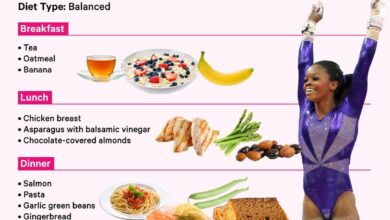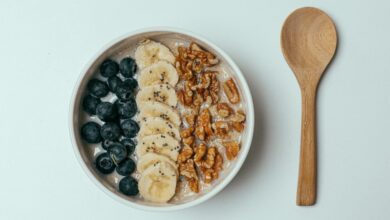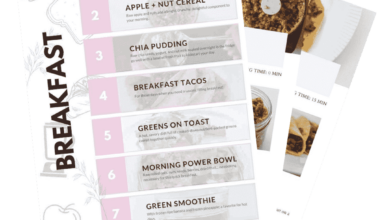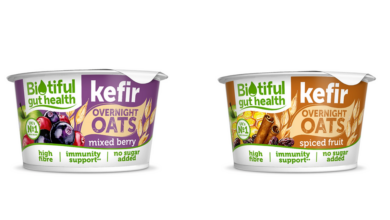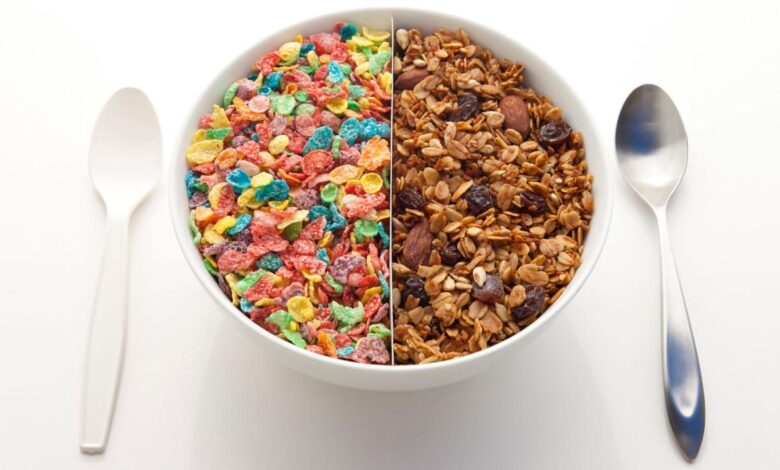
Can Cereal Be Healthy? A Look at the Facts
Can cereal be healthy? It’s a question that often pops up in breakfast discussions, especially when faced with a seemingly endless array of colorful boxes. While cereal is a convenient and familiar breakfast choice, the truth about its healthiness lies in the details.
The key to unlocking a healthy cereal experience lies in understanding the nutritional content of different types, making informed choices, and incorporating it into a balanced diet.
This article delves into the world of cereal, exploring the nutritional value of various types, examining the role of added sugar, fiber, and vitamins, and offering insights into making healthy choices. We’ll also discuss the potential health benefits of whole-grain cereals and address the potential downsides of excessive consumption.
Understanding Cereal Nutrition
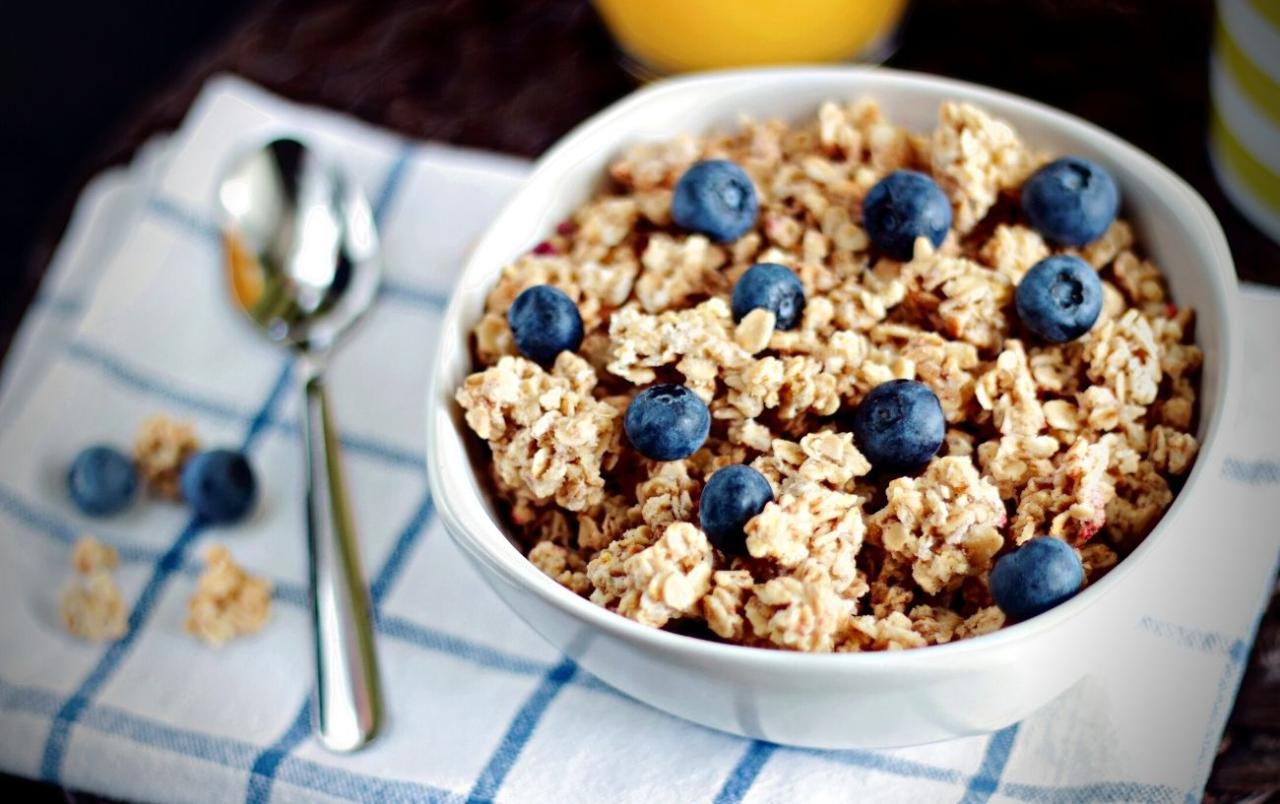
Cereal, a staple breakfast food, is available in a wide array of flavors and varieties. While some cereals are marketed as healthy options, others are loaded with sugar and unhealthy ingredients. To make informed choices, it’s crucial to understand the nutritional content of different cereal types.
Nutritional Content of Various Cereal Types
Different cereal types offer varying nutritional profiles. Here’s a breakdown of some common varieties:
- Bran flakes: Bran flakes are a good source of fiber, which is essential for digestive health. They also contain vitamins and minerals, including iron and B vitamins. Bran flakes are typically low in sugar and calories.
- Granola: Granola is often considered a healthy cereal option, but it can be high in calories and sugar. Some granola varieties contain nuts, seeds, and dried fruit, which can provide additional nutrients. However, it’s essential to check the nutrition label to ensure the granola is not excessively high in sugar.
- Frosted flakes: Frosted flakes are a sugary cereal that is low in nutritional value. They are high in calories and sugar and contain minimal fiber and vitamins.
Common Cereal Ingredients and Their Impact on Health
Cereal ingredients play a significant role in determining its nutritional value. Here’s a look at common ingredients and their impact on health:
- Whole grains: Whole grains are a good source of fiber, vitamins, and minerals. They provide sustained energy and promote digestive health.
- Added sugar: Added sugar is a major concern in many cereals. Excessive sugar consumption can contribute to weight gain, tooth decay, and other health problems.
- Artificial flavors and colors: Some cereals contain artificial flavors and colors, which may have potential health risks. These additives can contribute to allergies and other health concerns.
Role of Added Sugar, Fiber, and Vitamins in Cereal
Added sugar, fiber, and vitamins play crucial roles in the nutritional value of cereal:
- Added sugar: Added sugar contributes to the sweetness of cereal but provides minimal nutritional value. It’s important to choose cereals with low added sugar content.
- Fiber: Fiber is essential for digestive health and can help regulate blood sugar levels. Whole-grain cereals are typically high in fiber.
- Vitamins: Some cereals are fortified with vitamins, such as B vitamins and vitamin D. These vitamins can contribute to overall health and well-being.
Cereal and Dietary Guidelines: Can Cereal Be Healthy

Dietary guidelines provide recommendations for healthy eating patterns that can help individuals meet their nutritional needs and reduce the risk of chronic diseases. These guidelines emphasize the importance of consuming a variety of nutrient-rich foods from all food groups, including grains.
Recommended Daily Intake of Grains
Dietary guidelines recommend that adults consume between 45 and 65 grams of grains per day, with at least half of those grains being whole grains. Whole grains are a good source of fiber, vitamins, and minerals, and they can help promote satiety, regulate blood sugar levels, and reduce the risk of heart disease and type 2 diabetes.
Comparing Cereal to Other Breakfast Options
Cereal can be a convenient and quick breakfast option, but it’s important to compare its nutritional value to other breakfast choices.
Nutritional Value Comparison
- Cereal:Cereal can provide a range of nutrients, including carbohydrates, fiber, vitamins, and minerals. However, many cereals are high in added sugar, which can contribute to weight gain and other health problems.
- Eggs:Eggs are a good source of protein, healthy fats, and essential vitamins and minerals. They can help promote satiety and support muscle growth and repair.
- Yogurt:Yogurt is a good source of protein, calcium, and probiotics, which can support gut health. It can also be a good source of vitamins and minerals, depending on the type of yogurt.
- Oatmeal:Oatmeal is a whole grain that is high in fiber, which can help lower cholesterol levels and promote satiety. It is also a good source of vitamins and minerals, including iron, magnesium, and zinc.
Impact of Cereal Consumption on Dietary Balance
The impact of cereal consumption on overall dietary balance depends on the type of cereal consumed and the overall dietary pattern.
We all know cereal can be a quick and easy breakfast option, but is it actually healthy? It depends on the type of cereal, of course. If you’re looking to fuel your body with nutrients that support your joints, check out a beginners guide to joint health for some helpful tips.
While cereal might not be the ultimate joint-health booster, choosing a whole-grain option with added vitamins and minerals can certainly contribute to a balanced diet.
Dietary Balance Considerations
- Sugar Content:Cereals that are high in added sugar can contribute to excess calorie intake and can displace other nutrient-rich foods from the diet.
- Fiber Content:Cereals that are low in fiber can contribute to digestive problems and may not provide adequate fiber for optimal gut health.
- Nutrient Density:Cereals that are fortified with vitamins and minerals can contribute to meeting daily nutrient needs, but it’s important to choose cereals that are also low in added sugar and saturated fat.
Healthy Cereal Choices
Choosing a healthy cereal involves considering several factors to ensure you’re getting the nutrients you need without excessive sugar or unhealthy additives. This section will guide you through understanding key factors to consider when selecting a healthy cereal, and will provide you with a comparison table of popular brands to help you make informed decisions.
Factors to Consider When Choosing a Healthy Cereal, Can cereal be healthy
- Fiber Content:Fiber is crucial for digestive health, blood sugar control, and overall well-being. Look for cereals with at least 5 grams of fiber per serving. Aim for cereals with at least 10 grams of fiber per serving.
- Sugar Content:Added sugars are a major contributor to weight gain and other health issues. Choose cereals with less than 10 grams of sugar per serving. Aim for cereals with less than 5 grams of sugar per serving.
- Whole Grains:Whole grains are rich in fiber, vitamins, and minerals. Look for cereals that list “whole grain” as the first ingredient.
- Nutrient Density:A healthy cereal should provide a good source of essential nutrients like vitamins, minerals, and protein. Look for cereals fortified with vitamins and minerals.
Comparing Cereal Brands
The following table compares the nutritional profiles of popular cereal brands. This can help you make more informed choices.
| Cereal Brand | Serving Size | Calories | Fiber (g) | Sugar (g) | Whole Grains |
|---|---|---|---|---|---|
| Kellogg’s Frosted Flakes | 1 cup | 110 | 1g | 12g | No |
| General Mills Cheerios | 1 cup | 110 | 3g | 1g | Yes |
| Quaker Oats Oatmeal | 1 cup | 150 | 5g | 1g | Yes |
| Post Shredded Wheat | 1 cup | 100 | 6g | 0g | Yes |
Choosing Cereals with Minimal Added Sugar and High Fiber Content
- Read the Label:Always check the nutrition label and ingredient list. Look for cereals with low sugar content and high fiber content.
- Choose Whole Grain Options:Look for cereals with “whole grain” as the first ingredient.
- Avoid Cereals with Added Sugar:Look for cereals with less than 5 grams of sugar per serving.
- Consider Unsweetened Options:Choose unsweetened cereals or cereals with minimal added sugar.
Cereal and Health Benefits
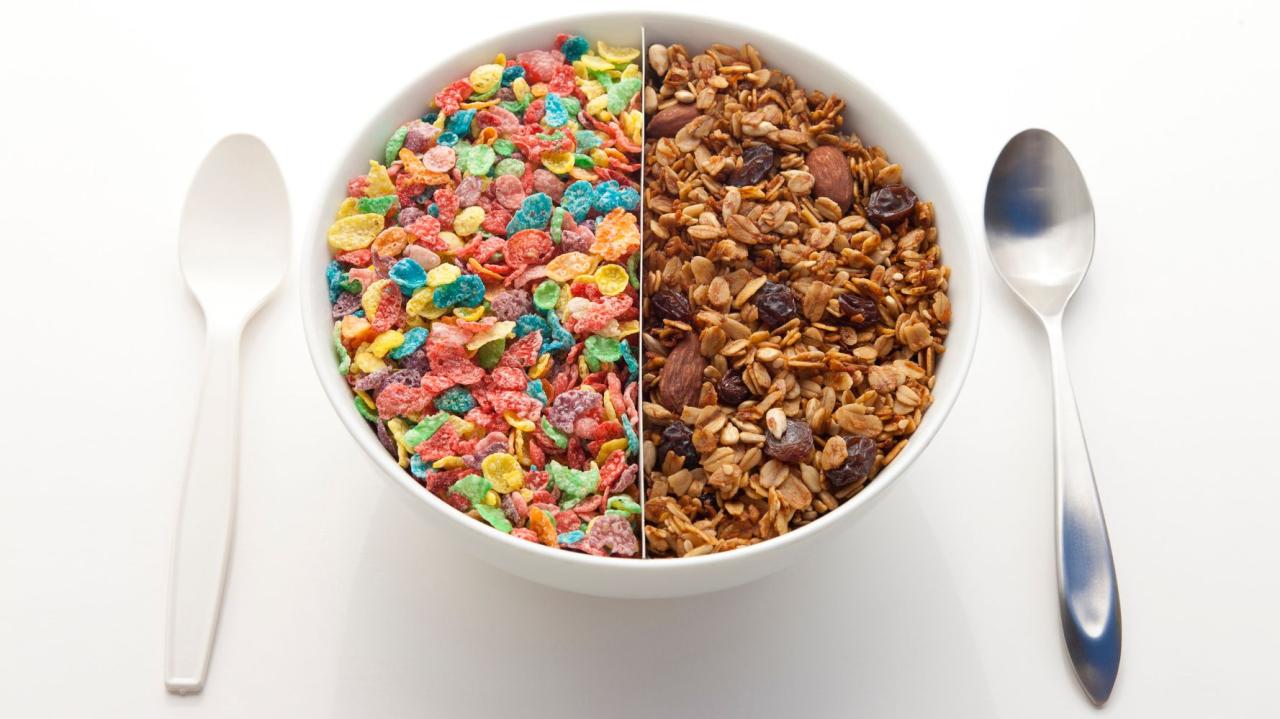
While cereal is often associated with a quick and convenient breakfast option, it can also contribute to a healthy diet when chosen wisely. Whole-grain cereals, in particular, offer a range of nutritional benefits that can positively impact overall health.
Can cereal be healthy? It depends! The type of cereal, the amount of sugar, and even the time of day you eat it all play a role. To truly manage your weight, understanding the role of hormones like leptin, ghrelin, and insulin is key.
Check out this article on 3 hormones to keep in mind for weight loss to learn more. Armed with this knowledge, you can make informed choices about your cereal consumption and ultimately achieve your weight goals.
Benefits of Whole-Grain Cereals
Whole-grain cereals provide essential nutrients that support various bodily functions. These benefits stem from the presence of fiber, vitamins, and minerals.
- Improved Digestion:The fiber in whole grains adds bulk to stool, promoting regular bowel movements and preventing constipation. This regular digestion is crucial for overall gut health.
- Reduced Risk of Heart Disease:Studies have shown a correlation between a higher intake of whole grains and a reduced risk of heart disease. This is attributed to the fiber’s ability to lower cholesterol levels and regulate blood pressure.
- Blood Sugar Control:Whole grains release glucose into the bloodstream gradually, preventing rapid spikes in blood sugar levels. This is beneficial for individuals with diabetes or those at risk of developing it.
- Weight Management:The high fiber content in whole grains contributes to feelings of fullness, reducing overall calorie intake and aiding in weight management.
Cereal and Blood Sugar Management
The glycemic index (GI) of a food indicates how quickly it raises blood sugar levels. Whole-grain cereals generally have a lower GI compared to refined-grain cereals, meaning they release glucose more slowly. This makes them a better choice for individuals with diabetes or those aiming to manage blood sugar levels.
Can cereal be healthy? It depends! A bowl of sugary, processed cereal definitely isn’t, but there are options out there that can be part of a balanced diet. Of course, if you’re trying to lose weight or manage your blood sugar, you might consider intermittent fasting, which I’ve been experimenting with using intermittent fasting with myfitnesspal premium.
It’s helped me be more mindful of my eating habits, and that includes being more selective about my cereal choices!
“Choosing a cereal with a lower GI can help prevent blood sugar spikes and promote better blood sugar control.”
Cereal for Weight Management
Cereal can be a part of a balanced diet for weight management. Opting for whole-grain cereals with a lower sugar content and incorporating them into a balanced meal plan can help manage weight.
- Portion Control:Sticking to the recommended serving size on the cereal box is crucial for weight management.
- Pairing with Healthy Toppings:Adding fresh fruits, nuts, or seeds to cereal can provide additional nutrients and fiber, making it a more satisfying and filling meal.
Cereal for Specific Health Goals
Cereal can be tailored to meet specific health goals. For example:
- Heart Health:Look for cereals fortified with heart-healthy nutrients like omega-3 fatty acids and fiber.
- Bone Health:Choose cereals fortified with calcium and vitamin D to support bone health.
- Energy Levels:Opt for cereals containing whole grains and iron to provide sustained energy throughout the day.
Considerations for Cereal Consumption
While cereal can be a nutritious and convenient breakfast option, it’s crucial to be mindful of its consumption to ensure it aligns with a balanced diet. Excessive cereal intake can lead to potential downsides, and understanding these aspects is vital for making informed choices.
Potential Downsides of Excessive Cereal Consumption
Consuming cereal in excess can have detrimental effects on your health. Here are some key considerations:
- High Sugar Intake:Many cereals, particularly those marketed towards children, are loaded with added sugar. Excessive sugar intake can contribute to weight gain, tooth decay, and an increased risk of chronic diseases like type 2 diabetes. The American Heart Association recommends limiting added sugar intake to no more than 25 grams per day for women and 36 grams per day for men.
- Nutrient Deficiencies:While some cereals are fortified with vitamins and minerals, relying solely on cereal for breakfast can lead to nutrient deficiencies. For instance, a cereal-only breakfast might lack adequate protein, fiber, and essential fatty acids, which are crucial for overall health and well-being.
Incorporating Cereal into a Healthy Breakfast Routine
To reap the benefits of cereal while mitigating potential downsides, consider these tips:
- Choose Whole-Grain Cereals:Opt for cereals made with whole grains, as they provide more fiber and nutrients compared to refined grains. Look for cereals with at least 5 grams of fiber per serving.
- Limit Added Sugar:Choose cereals with lower sugar content. Check the nutrition label and aim for cereals with less than 5 grams of sugar per serving.
- Pair with Other Nutritious Foods:Enhance your cereal breakfast by pairing it with other nutrient-rich foods. Add fruits, nuts, seeds, or low-fat dairy products for a more balanced and satisfying meal.
- Control Portion Size:Stick to the recommended serving size on the cereal box to avoid overconsumption of calories and sugar.
Alternative Breakfast Options
Beyond cereal, there are numerous healthy and delicious breakfast options to diversify your morning routine:
- Oatmeal:Oatmeal is a versatile and nutritious breakfast choice, rich in fiber and low in sugar. You can customize it with fruits, nuts, seeds, or spices.
- Eggs:Eggs are a great source of protein and other essential nutrients. They can be scrambled, poached, or made into an omelet with vegetables.
- Yogurt with Fruit and Granola:Greek yogurt is high in protein and calcium. Combine it with fresh or frozen fruit and a small amount of granola for a satisfying and nutritious breakfast.
- Smoothies:Smoothies are a convenient and portable breakfast option. Blend fruits, vegetables, yogurt, and protein powder for a nutrient-packed meal.
- Toast with Avocado and Egg:Whole-grain toast topped with mashed avocado and a poached or fried egg is a delicious and filling breakfast choice.
Last Word
In the end, whether or not cereal can be healthy depends on the specific choices you make. By understanding the nutritional profiles of different cereal types, prioritizing whole grains, and being mindful of added sugar content, you can make cereal a part of a balanced and healthy breakfast routine.
Remember, a healthy breakfast is a key to a healthy day, and cereal can play a valuable role when chosen wisely.

